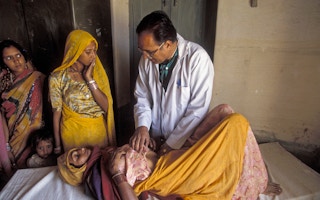Concern is growing about the effects of climate change on human health - from air pollution to disease outbreaks linked to extreme weather such as floods, prompting the COP28 climate summit in Dubai to hold its first Health Day.
An additional 250,000 people are projected to die each year due to climate change, according to the World Health Organization (WHO), while statistics show that one in four deaths can be chalked up to “preventable environmental causes”.
Climate change’s direct effects on health are seen in a myriad of ways, from air pollution to floods, droughts, storms, extreme heatwaves and wildfires.
The COP28 Declaration on Climate and Health urges a health system response to climate change, and Sunday’s Health Day will aim for a scale-up in finance for health-focused climate action, which only receives 2 per cent of adaptation funding and 0.5 per cent of overall climate funding.
Here’s what you need to know about climate change and health:
How is climate change affecting our health?
Around the world, healthcare experts say climate change is exacerbating various health problems - both directly, in the case of heat-related deaths or wildfire injuries, and indirectly, for example through an increase in disease related to extreme weather like floods.
Water-transmitted infectious illnesses such as cholera can become more problematic as temperatures and precipitation patterns become more extreme, while standing water can fuel the spread of diseases like malaria and dengue fever that are spread by mosquitoes.
“
These groups often lack adequate resources and infrastructure to mitigate or adapt to climate-related risks, making them disproportionately susceptible to adverse health outcomes.
Lujain Alqodmani, president, World Medical Association
Malnutrition, made worse by protracted droughts and other extreme weather events such as floods, is also hitting human health.
Air pollution stemming from the burning of fossil fuels causes more than 6.5 million deaths a year globally, a figure that is rising, according to a study published last year in the Lancet Planetary Health journal.
Climate change is also increasing the probability of another major virus-related event such as the Covid-19 pandemic, particularly as deforestation worsens, bringing people and wild animals in closer contact.
On top of that, the impacts of global warming are also linked to mental health distress as they cause poverty, displacement and food insecurity.
Who is worst affected by climate health impacts?
Marginalised communities and the poor bear the brunt of climate-induced health burdens, Lujain Alqodmani, president of the World Medical Association, told Context by email.
“These groups often lack adequate resources and infrastructure to mitigate or adapt to climate-related risks, making them disproportionately susceptible to adverse health outcomes,” she said.
That can be seen in places like Guatemala’s Chiquimula province, where more extreme weather is fuelling high rates of child malnutrition. Undernourished children are at risk of poor health throughout their lives.
Climate change exacerbates the risks faced by individuals who are already sick, disabled, on low-income, or vulnerable in other ways.
In poorer countries with high rates of maternal mortality such as South Sudan, heatwaves, for example, pose a growing threat to pregnant women and babies, putting them at higher risk of miscarriage, stillbirth or having a low-weight baby.
That is underlining the need for investments to boost healthcare access, specialists say.
“If we can help people to be as healthy as possible to begin with, they’re in a far better situation to be resilient and adapt to what goes at us,” said Jeni Miller, executive director at the Global Climate and Health Alliance.
How can we prevent diseases caused by climate change?
Ultimately, a swifter phase-out of polluting fossil fuels and adoption of renewable energy would improve human health, along with programmes to restore nature and foster more sustainable farming, experts say.
In the meantime, healthcare systems need data to plan and prepare for disasters and make themselves more climate-resilient, as well as adequate funding, facilities and trained personnel to handle increased health risks.
Practical steps include advocacy drives aimed at policymakers and the general public such as the “Conscious Effort to Repel Mosquito Menace” campaign in Bangladesh, raising awareness of mosquito-borne diseases.
Countries’ climate-related action plans should include discussion about health issues, Miller said, adding that involving local communities in policymaking was essential to building resilience and getting results.
“Involvement and ownership and empowerment itself is actually a protective factor,” Miller said.
This story was published with permission from Thomson Reuters Foundation, the charitable arm of Thomson Reuters, that covers humanitarian news, climate change, resilience, women’s rights, trafficking and property rights. Visit https://www.context.news/.










